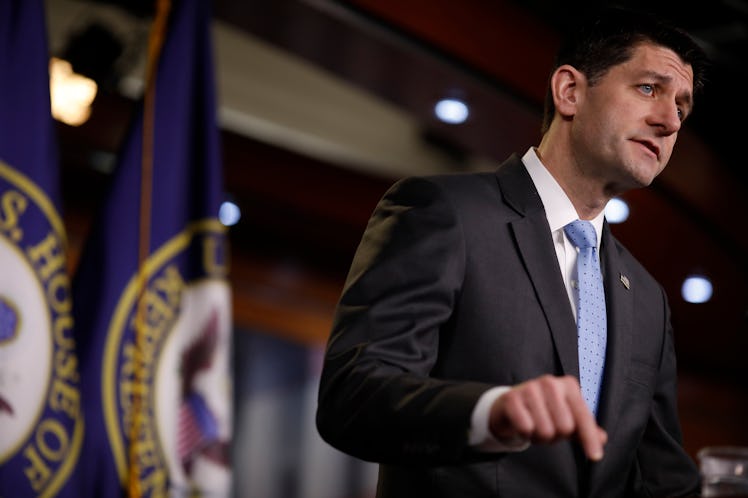
Congress Appears Unlikely To Do Anything About Gun Control, Again
As is the case with most mass shootings, the attack at Marjory Stoneman Douglas High School in Parkland, Florida prompted a national debate about gun legislation. As is the case with most of those debates, the latest appears unlikely to prompt significant legislative action. That much appears clear after House Speaker Paul Ryan (R-WI) cast doubt on whether Congress will do anything about gun control in the wake of the Parkland shooting.
During a press conference on Tuesday, Feb. 27, Speaker Ryan indicated that the proper recourse should be to focus on the failings of systems that had already been in place.
"We see a big breakdown in the system here," the speaker said. "In this particular case, there were a lot of breakdowns — from local law enforcement, to the FBI getting tips they didn't follow up on, to you know, school resource officers, who are trained to protect kids in these schools and who didn't do that. That, to me, is the most stunning one of them all."
Speaker Ryan's talk of a "breakdown" is a clear reference to the wave of reports about calls having been made to authorities on multiple occasions before the Stoneman Douglas shooting, with Florida residents warning that the alleged shooter displayed troubling behavior. A report from CNN, for example, says that over three dozen such calls were made to the Broward County Sheriff's office over a span of years.
Speaker Ryan's mention of "school resources officers," meanwhile, alludes to reports of an armed officer who resigned in the wake of the Parkland shooting, following reports that he had failed to confront the alleged shooter during the attack.
That Speaker Ryan focused on those particular points is a clear indicator that Republican leadership in the House is not targeting any legislation that would represent a dramatic shift in American gun policy.
Instead, the speaker emphasized improving already-established policy.
"We do know there are gaps in the background check system that need to be plugged," Speaker Ryan said during his press conference on Tuesday. "We passed a bill to do that and we think that should get done clearly."
Meanwhile, in the Senate, Republican leaders have been making attempts to do something similar: Pass a bill that addresses current background check systems.
“I’m for doing what’s achievable. If we want to get bogged down again, do nothing? To me that’s unacceptable,” Senate Majority Whip John Cornyn (R-TX) said on Monday, per Politico. "Fix NICS is “the most obvious place to start. I’m not saying finish there, but start there and let’s get that done.”
The Fix NICS bill Cornyn mentions is meant to improve reporting to the National Instant Criminal Background Check System. The bill is backed by Connecticut Democrat Chris Murphy — a potential 2020 presidential candidate who was once a House representative for the district where the 2012 Newtown, Connecticut massacre occurred — but Senate Minority Leader Chuck Schumer (D-NY) opposes Fix NICS, arguing that it accomplishes too little.
“If we only pass Fix NICS, we’ll be right back here after the next shooting, in nearly the same place. If all Congress does in response to the Parkland shooting is to pass Fix NICS, we won’t have done our job. We must do more than that,” Sen. Schumer said on the Senate floor Monday.
Taken altogether, the rhetoric coming from congressional leaders shows that, at the very least, politicians on Capitol Hill are far from coming to an agreement on what the best response to the Parkland Shooting is.
That very fact casts doubt on whether there will be any legislative response of significance from Congress at all.